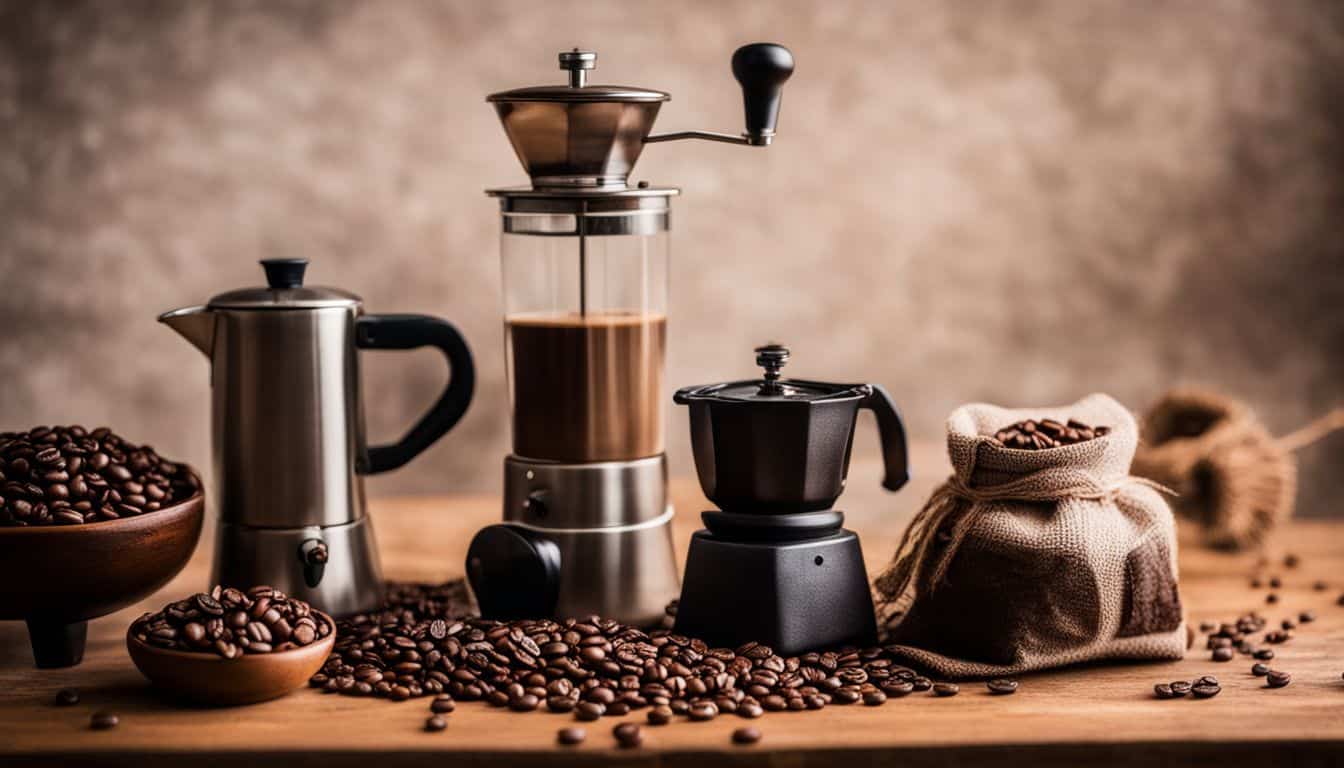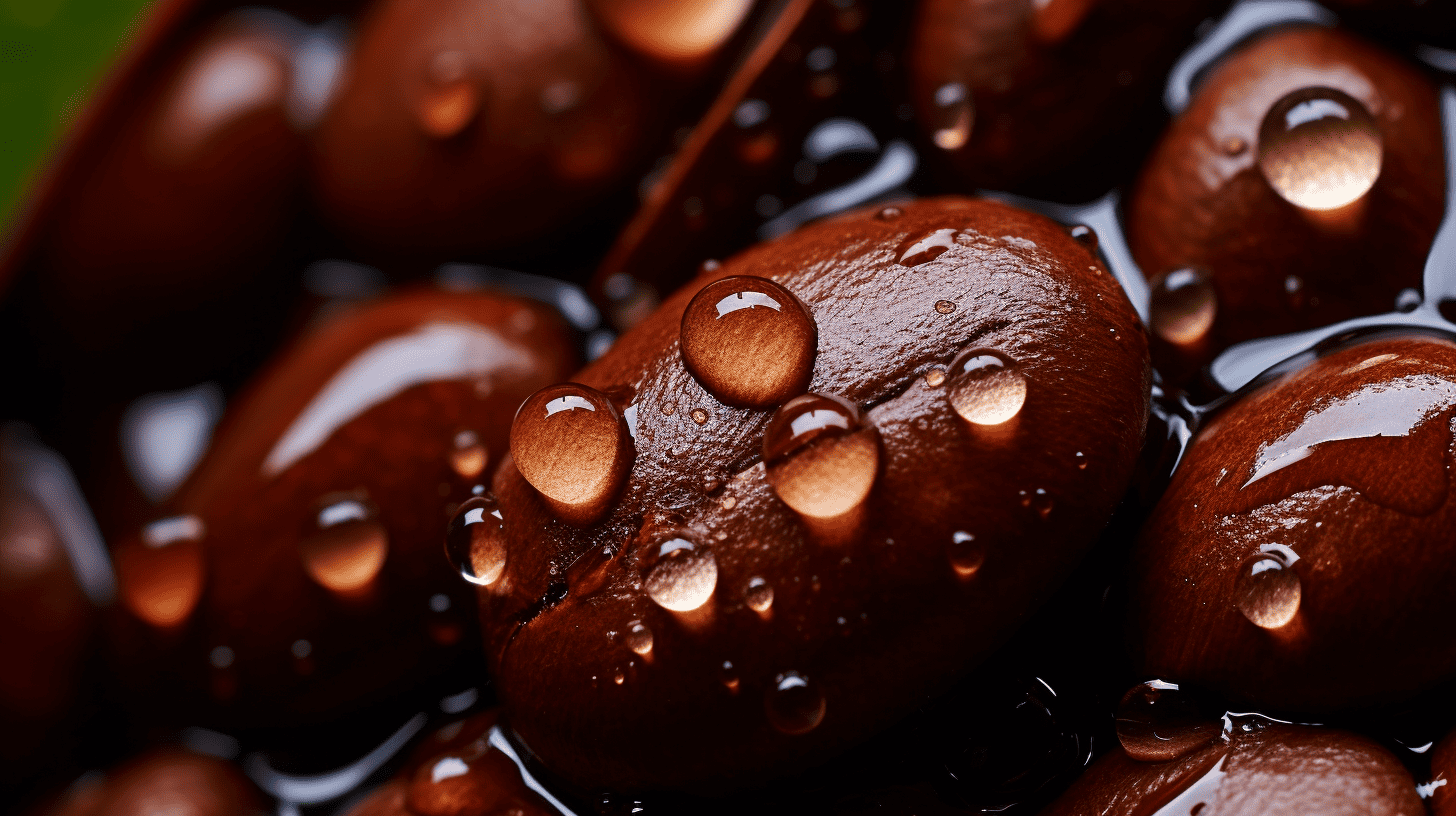Are you a coffee aficionado, confused about the real difference between coffee and decaf? Even as an ardent coffee lover myself, I’ve stumbled over deciphering the disparity. After delving into comprehensive research backed by science, I found that there is more to this than meets eye – like the fact that decaf coffee still contains around 7mg of caffeine! This blog post will demystify everything you need to know about these sibling brews in simple terms.
Prepare for a jargon-free exploration where understanding your beloved beverage gets even better!
Key Takeaways
- Decaf coffee is a type of coffee that has had most of its caffeine removed through a specific process. It contains significantly less caffeine compared to regular coffee, with only about 7mg per cup.
- The decaffeination process involves soaking green coffee beans in water to loosen the caffeine, followed by the use of solvents or activated carbon to bind with the caffeine. The Swiss Water Process is one method that doesn’t use chemicals.
- Both regular and decaf coffee have their own health benefits and drawbacks. Regular coffee provides an energy boost but can cause jitteriness and sleep disturbances. Decaf coffee allows you to enjoy the taste without the stimulating effects of caffeine but may still contain trace amounts that affect those who need to avoid it completely.
- When it comes to taste, decaf coffee has a milder flavor compared to regular coffee due to the removal of most of its caffeine. However, both types retain the rich aroma and characteristics of traditional brewed beans.
What is Decaf Coffee?
Decaf coffee is a type of coffee that has had the caffeine content removed through a specific process, resulting in a lower amount of caffeine compared to regular coffee.
Process of decaffeination
Let’s talk about the process of making decaf coffee. It starts with using water to soak green coffee beans. This helps to loosen the caffeine. Then, either a solvent or activated carbon is added in order to bind with the caffeine. Once this happens, the beans get a good rinse. This washes away the caffeine that has been pulled out. One popular method for doing this is called the Swiss Water Process. With this method, no chemicals are used and it only uses water.
Caffeine content in decaf coffee
Decaf coffee has significantly less caffeine than regular coffee. While regular coffee usually contains around 70-140mg of caffeine, decaf coffee only has about 7mg. This is because decaf coffee is made from regular coffee beans that have had at least 97% of their caffeine removed.
So if you’re looking to cut back on your caffeine intake or if you’re sensitive to caffeine, decaf coffee can be a good choice for you. Just keep in mind that even though it’s called “decaf,” it still contains trace amounts of caffeine, so it may not be suitable for those who need to completely avoid caffeine.
How Does Decaf Coffee Compare to Regular Coffee?
Decaf coffee differs from regular coffee in terms of taste and caffeine content.
Taste differences
Regular coffee and decaf coffee have similar taste profiles, with just one key difference – the amount of caffeine. Since most of the caffeine is removed during the decaffeination process, decaf coffee has a milder taste compared to regular coffee.
It still retains the rich aroma and flavor characteristics of coffee beans, but without the strong kick of caffeine. This makes decaf coffee suitable for those who enjoy the taste and experience of drinking coffee without wanting or needing the energy boost that comes with it.
Health benefits and drawbacks
As a coffee enthusiast, you might already know that both regular and decaf coffee come with their own sets of health benefits and drawbacks. Let’s examine them more closely.
| Coffee Type | Health Benefits | Drawbacks |
|---|---|---|
| Regular Coffee | Regular coffee is known for its ability to provide an energy boost due to its caffeine content. It can also improve cognitive function, increase metabolic rate, and potentially lower the risk of certain diseases like Parkinson’s and type 2 diabetes. | However, the high caffeine content may lead to jitteriness, anxiety, and sleep disturbances in some individuals. Overconsumption can lead to headaches, upset stomach, and increased heart rate. |
| Decaf Coffee | Decaf coffee offers similar potential health benefits as regular coffee, such as reducing the risk of liver disease and type 2 diabetes. It also allows coffee lovers to enjoy the taste and aroma of coffee without the stimulant effects of caffeine. This makes it suitable for those sensitive to caffeine or looking to decrease their caffeine intake. | The downside is that decaffeination processes can sometimes use chemical solvents, though methods like the Swiss Water Process are chemical-free. And while decaf coffee has much lower caffeine content, the trace amounts may still affect those who need to completely avoid caffeine. Some also find the taste less robust compared to regular coffee. |
While both types of coffee have their pros and cons, they offer the joy of coffee consumption tailored to individual preferences and needs. Whether you prefer regular coffee for its energizing benefits or decaf for a less caffeine-intensive experience, it’s all about finding what suits you best.
Pros and Cons of Drinking Regular Coffee
Regular coffee provides an energy boost and is known for its acquired taste, but it also comes with health benefits and risks that should be considered.
Energy boost
Drinking regular coffee can provide an energy boost due to its caffeine content. Caffeine stimulates the central nervous system, making you feel more awake and alert. Regular coffee usually contains around 70-140mg of caffeine, which can give you that extra kick when you need it.
However, if you’re looking for a milder energy boost without the stimulating effects of caffeine, decaf coffee is a suitable option. Decaf coffee still contains trace amounts of caffeine (around 7mg), but it’s significantly less than regular coffee.
So, while it may not provide the same level of energy as caffeinated coffee, decaf can still give you a gentle pick-me-up without interrupting your sleep or causing jitters.
Acquired taste
I used to think that coffee was an acquired taste, but now I enjoy its unique flavor. Some people may find it bitter or strong at first, but over time, you might start appreciating its rich aroma and complex flavors.
Decaf coffee can also be an acquired taste because it lacks the stimulating effects of caffeine. But for those who want to enjoy the pleasure of drinking coffee without the energy boost, decaf can be a great option.
It’s all about finding what you like and what works best for your preferences and lifestyle!
Health benefits and risks
Decaf coffee offers some health benefits, making it a good option for those who want to reduce their caffeine intake. With significantly less caffeine compared to regular coffee, decaf can help individuals sensitive to caffeine’s stimulant effects. It can also be enjoyed in the evening or before bedtime without interfering with sleep. However, it’s important to note that decaf coffee still contains trace amounts of caffeine, so it may not be suitable for people who need to completely avoid caffeine. Additionally, some people claim that decaf coffee may taste less robust or flavorful compared to regular coffee due to the process of removing caffeine from the beans.

Pros and Cons of Drinking Decaf Coffee
Decaf coffee offers potential health benefits, such as reduced risk of heart disease and lower levels of anxiety, but it lacks the energy-boosting effects of caffeine. Additionally, limited options are available for decaf coffee compared to regular coffee varieties.
Potential health benefits
Decaf coffee offers potential health benefits for individuals who want to reduce their caffeine intake. Since it has significantly less caffeine than regular coffee, decaf can be a good choice for people who are sensitive to caffeine or have certain health conditions that require them to limit their caffeine consumption.
Drinking decaf coffee may help lower the risk of heartburn, insomnia, and jitters associated with consuming too much caffeine. Additionally, some studies suggest that decaf coffee could have protective effects against certain diseases like Parkinson’s disease and type 2 diabetes.
However, it’s important to note that more research is needed to fully understand these potential health benefits and how they compare to the benefits of regular coffee consumption.
Lack of caffeine benefits
Decaf coffee has a lack of caffeine, which can be beneficial for some people. Without the stimulating effects of caffeine, decaf coffee allows individuals to enjoy the taste and experience of drinking coffee without worrying about getting too wired or jittery.
It’s a good choice for those who are sensitive to caffeine or want to reduce their intake. However, it’s important to note that decaf coffee still contains trace amounts of caffeine, so it may not be suitable for individuals who need to completely avoid caffeine.
Nonetheless, if you’re looking for a way to enjoy coffee without the energy boost or potential sleep disturbances, decaf coffee is a great option.
Limited options available
When it comes to decaf coffee, there may be limited options available compared to regular coffee. However, you can still find a variety of decaffeinated coffee brands and types to choose from.
Whether you prefer whole bean, ground, instant, or specialty coffee drinks, there are options out there for you. Just keep in mind that the availability of specific flavors or blends in decaf form might be more limited compared to their caffeinated counterparts.
Nonetheless, with the growing popularity of decaf coffee, more options are becoming available on the market. So don’t worry – even if your caffeine intake is limited or restricted for any reason, you can still enjoy a delicious cup of decaf coffee!
Conclusion on Difference Between Coffee And Decaf
The main difference between regular coffee and decaf is the amount of caffeine they contain. Decaf coffee has removed most of its caffeine, so it has much less than regular coffee.
While both types have pros and cons, it ultimately comes down to personal preference and whether or not you want caffeine’s energy boost.
Is Black Tea a Healthier Alternative to Coffee for Caffeine Intake?
The caffeine content comparison: black tea vs coffee reveals that black tea can be a healthier alternative for caffeine intake. While both beverages contain caffeine, black tea has a lower caffeine content than coffee. Choosing black tea can provide a moderate energy boost without the jitteriness associated with excessive caffeine consumption.
FAQs on Difference Between Coffee And Decaf
1. What is the main difference between coffee and decaf?
The main difference between coffee and decaf is that regular coffee contains caffeine, while decaf has had most of its caffeine removed.
2. Does decaf taste the same as regular coffee?
Decaf generally tastes similar to regular coffee, but some people may notice a slight difference in flavor due to the removal of caffeine.
3. Is decaf completely caffeine-free?
While decaf has significantly less caffeine than regular coffee, it is not completely caffeine-free. It still contains a small amount of caffeine, although much less than regular coffee.
4. Can I get the same energy boost from drinking decaf as I do from regular coffee?
No, since most of the caffeine has been removed from decaf, it does not provide the same energy boost as regular coffee. However, it can still offer a flavorful beverage option without the stimulating effects of caffeine.





Leave a Reply